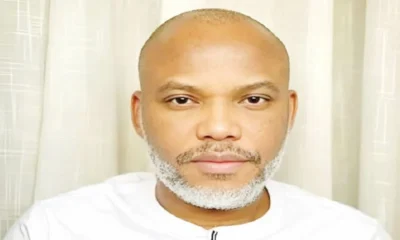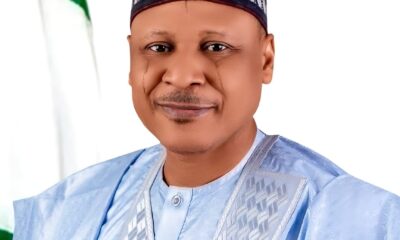Education
President Tinubu launches student loan Thursday, foreign scholars seek inclusion
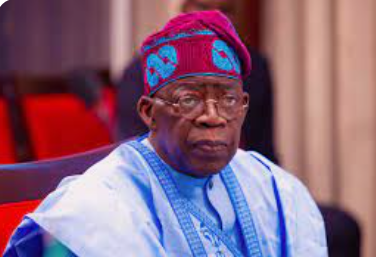
Tinubu will launch the Student Loan Scheme on Thursday, March 14, 2024.
The Special Adviser to the President on Media and Publicity, Mr Ajuri Ngelale, said this on Sunday during TVC’s Politics on Sunday monitored by our correspondent.
On the programme titled ‘Counting the Cost of Presidents Tinubu’s Reforms,’ Ngelale highlighted some of the President’s welfare initiatives being implemented at the moment, saying, “Later this week, on Thursday, the President will launch the historic National Student Loan Programme.”
“This is a major form of obligation reduction for Nigerians and families and young people at a time when Nigerians are feeling the pinch. We believe this is the way to go,” he added.
President Tinubu had on June 12, 2023, signed the Access to Higher Education Act, 2023, into law to enable indigent students to access interest-free loans for their educational pursuits in any Nigerian tertiary institution.
The move was in “fulfillment of one of his campaign promises to liberalise funding of education,” a member of the then Presidential Strategy Team, Dele Alake, said.
The Act, popularly known as the Students Loan Law, also established the Nigerian Education Loan Fund, which is expected to handle all loan requests, grants, disbursement, and recovery.
The government initially said it would take effect in September, but it did not. It later shifted the take-off to January but that also did not happen.
The President proposed N50bn for its take-off in the 2024 budget he presented to the National Assembly last November.
On February 7, the Executive Secretary of the Nigeria Education Loan Fund, Dr Akintunde Sawyerr, exclusively confirmed to our correspondent that the much-awaited scheme would go live on February 21, when President Tinubu launches it at the State House, Abuja.
However, the launch was delayed, with Sawyerr, alongside Presidency sources, explaining that the lag time was to enable the fund to expand its mandate to include students seeking loans for skills development, as directed by the President.
After receiving a briefing from the NELFUND team led by the Minister of State for Education, Dr Yusuf Sununu, on January 22, the President directed the fund to extend interest-free loans to Nigerian students interested in skill-development programmes.
Tinubu based his decision on the need for the scheme to accommodate those who may not want to pursue a university education, noting that skill acquisition is as essential as obtaining undergraduate and graduate academic qualifications.
“This is not an exclusive programme. It is catering to all of our young people. Young Nigerians are gifted in different areas,” he said.
Linking this directive to the delay, the President’s Special Adviser on Information and Strategy, Mr Bayo Onanuga had told The Ekwutosblog , “Don’t forget that the last time they met, the President asked them to go and expand their mandate to include those who want to learn vocational skills. That could be the reason why the whole thing was delayed; they had to increase the scope.”
On Saturday, Sawyerr also told our correspondent that the delay was due to unperfected backend systems to power the application process as the scheme is “entirely technologically driven.”
He said, “The delay in take-off was basically to enable the agency to put all necessary measures in place as the scheme is entirely technologically driven.”
Meanwhile, members of the Nigerian community in West Yorkshire, United Kingdom have called for the inclusion of students studying abroad in the student loan scheme.
Representing the community members in a meeting with the acting Nigerian High Commissioner to the United Kingdom, Cyprian Heen, on Saturday, Tunmise Ajiboye urged him to advocate the inclusion of students in foreign countries in the government’s loan scheme.
In a statement on Sunday by Ajiboye, he noted that enabling students abroad to participate in the loan scheme would contribute to improving access to higher education for Nigerians studying overseas.
He also urged the government to provide support for students regarding exchange rates and foreign exchange, ensuring that they have access to favourable rates and assistance in managing their financial needs.
He said, “As a representative of Nigerians living here in the United Kingdom, we are gathered here not just as individuals seeking education and economic breakthroughs but as a collective voice demanding support and recognition from our government back home.
“Therefore, today, we stand united in calling upon the Nigerian government to make the following requests:
“Diaspora voting: International passport renewal delivery by post in Nigeria and the diaspora.
“Support for the students in the exchange rate and FX; inclusion of Nigerians studying abroad in the proposed student loan programme of the Federal Government.
“Lastly, provide a platform for Nigerians living abroad who may want their children to get Nigeria’s state of origin.”
Education
Federal Government Denies Approving History Textbook Without Igbo Section
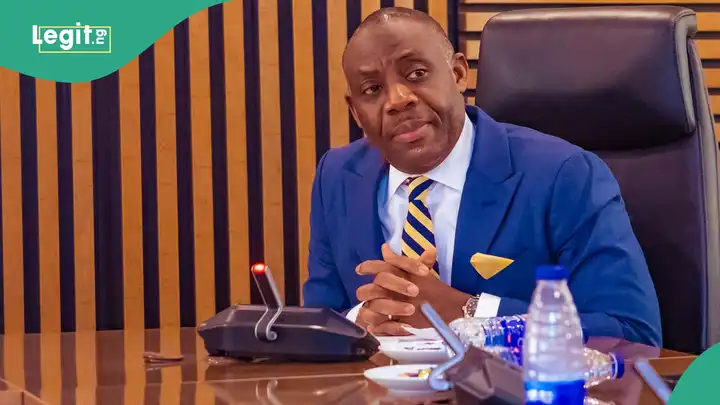
The Federal Ministry of Education has dismissed claims that it approved the “Living History” textbook, which reportedly excluded Igbo content Officials confirmed the book was never submitted to the National Educational Research and Development Council (NERDC) and is not on the list of approved instructional materials The Ministry urged schools and parents to disregard misinformation, stressing that only authorized textbooks reflect Nigeria’s cultural diversity and national values
The Federal Ministry of Education has denied approving the “Living History” textbook, which reportedly excluded Igbo content. As reported by Dailytrust, officials clarified that the book was not authorized for use in any Nigerian school.
In a statement issued by the Director of Press and Public Relations, Boriowo Folasade, the Ministry stressed that “Living History” had never been submitted to the National Educational Research and Development Council (NERDC).
The Council is the statutory body responsible for reviewing, evaluating, and approving instructional materials under the national curriculum.
As a result, the Ministry confirmed that the book was neither recommended by NERDC nor included on the official list of approved History textbooks.
The Ministry explained that consultations with NERDC leadership and a review of officially endorsed materials confirmed that “Living History” did not form part of the approved instructional resources for schools nationwide. Warning against misinformation Parents, teachers, school proprietors, and administrators were urged to disregard speculation, misinformation, and what the Ministry described as “emotionally charged narratives” surrounding the book. Officials warned that unapproved materials could undermine curriculum standards and negatively affect teaching and learning outcomes. “All approved textbooks strictly comply with the national curriculum and reflect Nigeria’s rich cultural diversity, shared history, and core national values, while promoting inclusivity, balance, and unity,” the statement noted.
Call for responsible discourse Folasade further appealed to the public to support responsible discourse, reject divisive misinformation, and verify the approval status of educational materials through official channels before adoption.
“The public is encouraged to consult NERDC for verified information on approved textbooks. Education thrives on truth. Unity thrives on understanding,” the statement added.
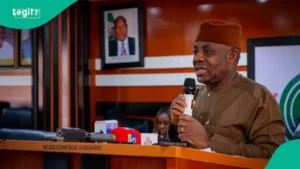
Ministry urges schools and parents to reject misinformation on unapproved textbooks. Photo credit: Tunji Alausa/x Source: Twitter
FG addresses claim it abandoned Nigerian students in Morocco Legit.ng earlier reported that the Federal Government has rejected reports suggesting that Nigerian students studying in Morocco under a bilateral scholarship scheme were abandoned or denied funding. Education authorities described the circulating claims as misleading and deliberately crafted to distort public understanding.
In a post on its official social handles, the Education ministry clarified that every beneficiary admitted into the Bilateral Education Scholarship programme before 2024 received payments up to the approved 2024 budget cycle. Any outstanding delays were linked to fiscal adjustments currently being resolved through engagements between the education and finance ministries. Education Minister Dr Maruf Tunji Alausa confirmed that no fresh bilateral scholarship awards were issued from October 2025 onward. Documents circulating online claiming otherwise were described as unauthenticated and designed to discredit government policy. According to the ministry, the decision to discontinue government-funded overseas bilateral scholarships followed a policy assessment which showed that Nigerian universities, polytechnics and colleges of education now possess the capacity to deliver similar academic programmes locally. Source: Legit.ng
Education
FG Opens Applications for 2026 PTDF-Funded Overseas Scholarship

The Federal Government has opened applications for the 2026 Petroleum Technology Development Fund (PTDF) Overseas Scholarship Scheme.
The announcement in a post on X (formerly Twitter) by the Office of the Special Adviser to the President on Social Media, Dada Olusegun, said the programme offers Nigerian postgraduate students the opportunity to study abroad.
According to the post, successful applicants will pursue studies in the United Kingdom, Germany, France and Malaysia under the fully funded scholarship scheme.
“FG has announced the commencement of applications for 2026 Petroleum Technology Development Fund (PTDF) Scholarships overseas,” the post stated.
Details published on the PTDF scholarship portal show that the scheme is open to MSc and PhD candidates in disciplines relevant to the oil and gas sector. Benefits include full tuition, return air tickets, accommodation, living allowances, health insurance and bench fees where applicable.
The agency said the initiative is designed to strengthen local expertise in the energy sector.
“The 2026 Overseas MSc and PhD Scholarships provide access to world-class training, research facilities, and global expertise, while developing indigenous capacity in Nigeria’s oil and gas sector,” PTDF said.
For MSc applicants, eligibility requirements include a minimum of a Second Class Lower (2.2) degree or higher, completion of the National Youth Service Corps (NYSC) programme, computer literacy, and at least five O’Level credits, including English Language and Mathematics.
PhD applicants are also required to submit a research proposal of no more than five pages detailing their objectives, methodology and data collection strategy.
PTDF explained that PhD candidates studying in the United Kingdom will follow a split-site arrangement, conducting research between the College of Petroleum and Energy Studies, Kaduna (CPESK), and selected partner universities, including Robert Gordon University, the University of Strathclyde and the University of Portsmouth.
The agency noted that the scholarship is highly competitive and selection will be strictly merit-based.
“Only candidates who demonstrate outstanding merit and suitability will be considered,” the statement said.
Applicants will be assessed based on academic performance, quality of research proposals, professional memberships and the relevance of their chosen fields to the oil and gas industry.
PTDF also warned that applicants must verify their National Identity Number (NIN) before applying, adding that multiple submissions or falsified documents would lead to automatic disqualification.
Interested candidates are to apply online via scholarship.ptdf.gov.ng for approved programmes at PTDF partner institutions.
The deadline for applications is February 27, 2026.
Education
Report all forms of sexual pressure from lecturers – Rector tells students
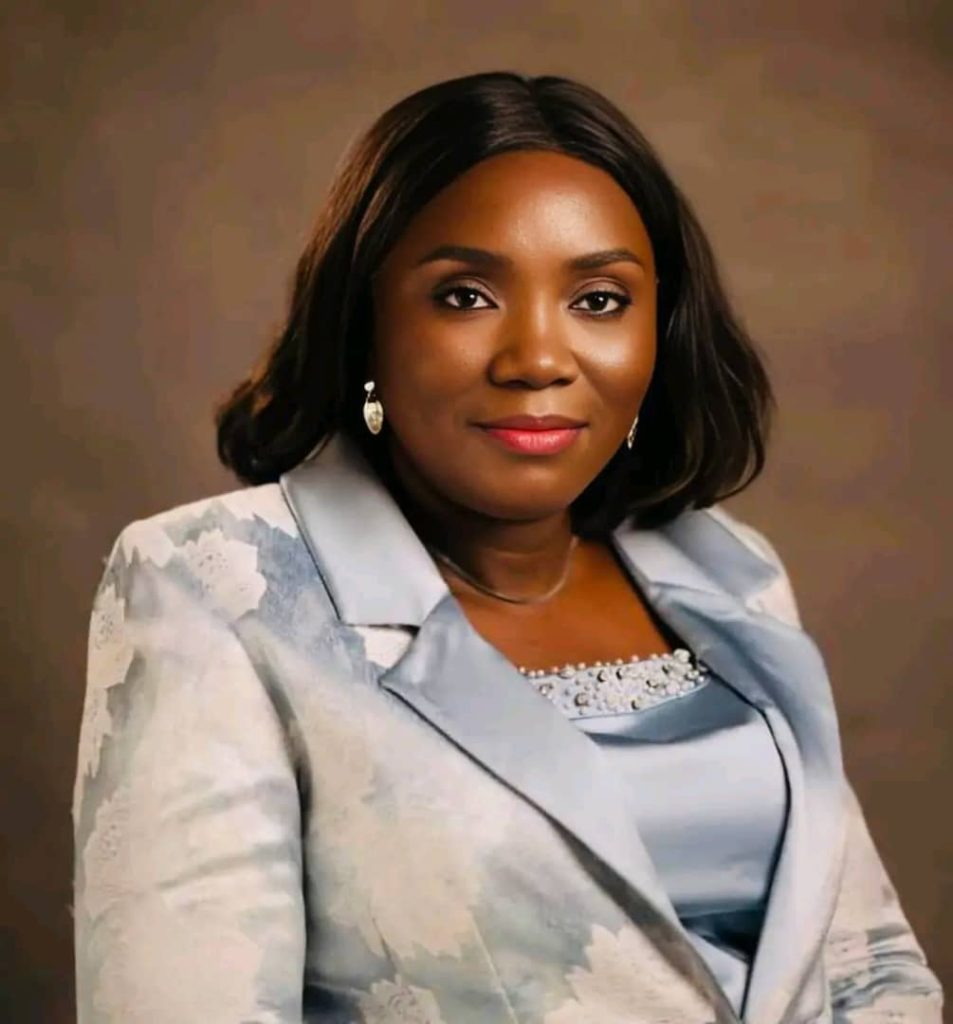
The Rector, Federal Polytechnic Ukana, Akwa Ibom State, Mrs Eduma Essien, has encouraged students of the institution to report any form of sexual pressure or harassment from lecturers to the management or the Anti-Sexual Harassment Unit of the Polytechnic for appropriate investigation and sanctions.
Essien also cautioned students against engaging in examination malpractices, cultism or any form of antisocial behaviors, adding that the school will not condone any of the vices.
She also charged them to be conversant with the polytechnic’s policies, rules and regulations.
Speaking during the 12th Orientation Exercise for newly admitted students on Tuesday, the rector also stated that the sale of handouts is prohibited in the polytechnic, saying students should only purchase approved textbooks.
Essien assured the students that as long as she remains at the helm of affairs, learning would be made easy in an environment that promotes discipline, safety and academic excellence.
She said, “I encourage you to report any form of sexual pressure from lecturers to the management or the Anti-Sexual Harassment Unit. This institution frowns at the exchange of gifts for marks.
“We also have zero tolerance for cultism and examination malpractice because we want to produce graduates who can confidently defend their certificates anywhere.”
The rector explained that students of the polytechnic would not only graduate with academic certificates but acquire practical skills through the institution’s mandatory skills acquisition program.
According to her, the world is increasingly focused on what individuals can offer to society.
Essien equally encouraged the students to cooperate with their lecturers by diligently carrying out their assignments to make teaching and learning effective and rewarding.
The orientation exercise also featured resource persons who delivered lectures on various aspects of the polytechnic system. They include the Registrar, Mr Idhigu Lucky, the Bursar, Sir Emmanuel Esomonu, the Polytechnic Librarian, Mr Ehikioya Uduebor, among others.
-
Business1 year ago
US court acquits Air Peace boss, slams Mayfield $4000 fine
-

 Trending1 year ago
Trending1 year agoNYA demands release of ‘abducted’ Imo chairman, preaches good governance
-

 Politics1 year ago
Politics1 year agoMexico’s new president causes concern just weeks before the US elections
-

 Politics1 year ago
Politics1 year agoPutin invites 20 world leaders
-

 Politics1 year ago
Politics1 year agoRussia bans imports of agro-products from Kazakhstan after refusal to join BRICS
-
Entertainment1 year ago
Bobrisky falls ill in police custody, rushed to hospital
-
Entertainment1 year ago
Bobrisky transferred from Immigration to FCID, spends night behind bars
-
Education1 year ago
GOVERNOR FUBARA APPOINTS COUNCIL MEMBERS FOR KEN SARO-WIWA POLYTECHNIC BORI









